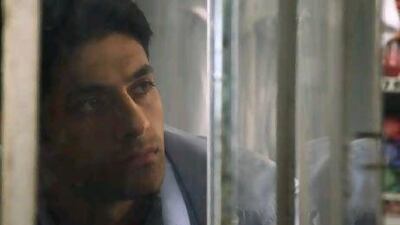Detroit Unleaded is set in the legendary Motor City, which has hit hard times. As has the family of the young Sami, a Lebanese-American in his 20s who expected to be studying at a university but instead works at a gas station with his cousin Mike.
The pair operates the shop at the gas station, standing behind bulletproof glass, 24 hours a day.
The romantic comedy - which premiered at the Toronto International Film Festival this week - is the first feature by Rola Nashef, 39, a Lebanese-American who grew up in the state of Michigan.
Although the film is not autobiographical, she says it is based on her observations of the rough city.
"When I came to Detroit, it was the first time that I saw bullet-proof glass," she says. "And behind every wall of bullet-proof glass, there was a young Arab guy. I kept thinking that being behind that lens had to change your view of the world, constantly looking through this barrier."
Many of the gas stations in Detroit are small businesses run by Arab immigrants who are part of the largest Arab community in the US, she says.
"When I kept seeing these repeated images of young Arab guys, trapped in a cage, I kept asking myself, 'This is the American dream that everybody's coming here for, to sit, trapped in a gas station for hours on end?'
"I think a lot of people can relate to that," she adds, "subscribing to some dream, but losing yourself in the process."
In a divided, violent city, Sami's gas station becomes an improbable place of camaraderie. "The gas station seemed to be one of the few places where people were in the same room with each other," Nashef says. Life becomes more than a 24-hour job when Sami meets Najlah (Nada Shouhayib), whose family, also from Lebanon, sells phone cards to Sami and Mike.
Nashef came to the US in 1978 at the age of five. Her parents fled the civil war and settled in Lansing, Michigan, about an hour's drive west of Detroit, where Arabs were rare. Her father worked at the General Motors factory for 25 years. "He did fulfil his American dream of coming here, settling, finding a good job and supporting a family," she says.
Nashef worked for local charities and at her family's bakery and flower businesses before turning to film. When she made a short version of Detroit Unleaded in 2007, she saw there was an audience for the story.
At the core of the cast is the Arab-Canadian comedian Mike Batayeh, who plays a wise-cracking cousin to the main character Sami. EJ Alassi, recently graduated from college and in his first feature role, plays the lead. Another one of the female players, Nada Shouhayib, had never acted before. The young cast reflects a surge in interest in film among Arab-Americans, Nashef says. "For the short in 2007, we had 20 Arab actors show up. For the feature, we had 150."
One surprise for Arab audiences will be Akram El Ahmar in the role of Sami's father, Ibrahim. El Ahmar starred in Lebanese films and television before the civil war. "Nobody had heard from him in more than 20 years, and he ended up in Dearborn, next to Detroit, and in the cast," says Nashef. In a nostalgic salute to Lebanon, Ibrahim puts an old white audio cassette in the player in his car, and listens to the Lebanese singer Salwa Al Qatrib on one drive to work.
Thanks to Arab-American investors - in a city where investment money is scarce - Nashef and her team salvaged one of Detroit's many abandoned gas stations to serve as the microcosm of the Arab immigrant experience.
"To me it's about repurposing. We took this building that was abandoned, and we made it into art." And it's art with humour, she stresses, even in a violent city known for its high unemployment and abandoned homes.
"I can never stay serious for too long - even in the darkest tragedy, you'll find humour. It's within our nature."

